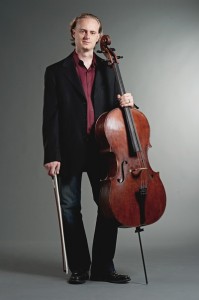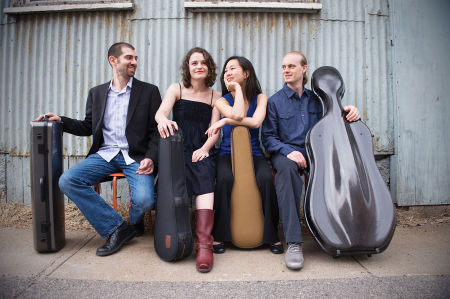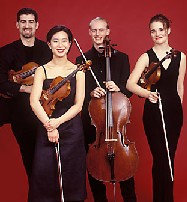Classical Music Interview: Playing by Heart — The Chiara String Quartet
Playing by heart with these three incredible people is the most exhilarating thing I’ve ever done as a musician, and I look forward to many more years of doing this with the Chiara Quartet. — Gregory Beaver of the Chiara String Quartet
By Susan Miron
On Friday, March 8, the Chiara String Quartet will perform on the Blodgett Chamber Music Series in Paine Concert Hall at Harvard University. What is extraordinary about this performance is that the group will be performing two of the quartets, the gorgeous Debussy and Ravel, by memory. The third piece, Ainsi la nuit by Dutilleux, they hope eventually to perform from memory as well. I sent, via e-mail, some questions to the Chiara’s cellist, Gregory Beaver, about the challenges playing from memory posed to the four musicians. His responses below are revelatory.
Arts Fuse: When did you start doing this? Was it one person’s idea?
Gregory Beaver: We first began playing by heart a year and a half ago. We had recorded the three Brahms String Quartets and his Op. 111 G Major viola quintet with Roger Tapping over the course of four years, very deliberately and carefully learning and rehearsing each piece, but we were not satisfied with the final recording. After many discussions, we took the financially risky step of abandoning the five years of work that had gone into that recording and to start over from scratch, choosing instead to record all four works in a single year’s time.
Roger graciously agreed to have another go at the project with us. As we were rehearsing the C minor and A minor quartets, we all felt that this needed to be a step above the last time we recorded. We grappled with several possible ideas about how to do this. None of them felt quite right, and the stress of rehearsing at the highest possible level was quite high. Hyeyung Julie Yoon (our second violinist) ultimately suggested that we make a serious attempt to record the quartets from memory, and things have spiraled from that point.
Playing by heart was not a new idea to us. We saw Eighth Blackbird perform in their Merkin Hall debut from memory, complete with choreography on the stage. Jonah [Sirota] performed the slow movement of the Debussy Quartet by heart when he was a student at Greenwood Music Camp, and we have all performed individually from memory many times. We had even performed a movement of Mozart’s “Dissonance” K. 465 quartet from memory on a whim in a performance for school children after one of them asked if we could play anything without music stands. However, this is very different from committing to prepare an entire piece by heart in advance of the performance.
Arts Fuse: Do you all have, in general, good memories? (I ask because I had a fabulous memory—I’m a harpist—until I was 40. The gift has all but disappeared over the past two decades.)

Chiara’s cellist, Gregory Beaver. The group will be playing all of its repertoire by heart starting in the 2014-2015 season.
Gregory Beaver: Actually, no. There is a large degree of variation in each member’s natural ability to memorize. Some of us have incredible long-term memories, with the ability to remember entire pieces years after we first worked on them, and others have to struggle to remember notes a week later. However, the act of performing from memory has been equally challenging for each one of us. No single member has a monopoly on either surprise memory slips or perfect recall in performance.
One of the things I have found most incredible is watching my colleagues all come together from such different angles to the same place with memory. For me, it’s humbling to be a part of every performance we give by heart, and I’m very grateful that we have decided to do this and that I get to be a part of it.
Arts Fuse: Do you think it improves the performance?
Gregory Beaver: The difference is fascinating and palpable. For us, the connection to the music and the phrasing is stronger, although we also notice much more the flaws in our own playing, so our playing sounds only slightly better to our ears. Audience members who have ventured backstage after a performance reported that the energy and excitement of the experience is at a completely different level.
Our performance at Harvard will be an interesting comparison because we are performing two works by heart, the string quartets of Ravel and Debussy, and one quartet with music, Dutilleux’s Ainsi la Nuit. We have performed all three works multiple times, and had we chosen to, the Dutilleux would have been possible to play by heart. But we decided to focus our energies on just the two pieces for this concert. Thus, the audience will be able to experience the difference firsthand.
Arts Fuse: Does it take much more rehearsal time?
Gregory Beaver: Yes and no.
For our earliest experiments with memory, it took about three times as long to learn a quartet. The first and most important thing we did was establish some ground rules. No one would be expected to memorize, and any member could veto playing by memory at any time in the week before the recording. The same was true of performances. This guarantee of safety really helped us work through the difficulty of figuring out how to memorize as a group.
In the beginning, we had to perform a piece seven or eight times before the memory settled. Now, it takes us about the same amount of time to memorize a work as it used to take us to learn the work initially, but the level of performance is far deeper than we have grown accustomed to in our work with music. When we memorize a work, it front-loads the stress and deep exploration, so that by the time we reach our first performance we’ve cut out those six or seven performances it used to take to learn pieces.
For this reason, we recently decided to drop our ground rules. We’ve grown comfortable enough with memorizing that we will be playing all of our repertoire by heart starting in the 2014–2015 season, and our first big project will be performing by heart the six quartets of Béla Bartók in two concerts.
Arts Fuse: Do certain works—Haydn, Mozart—lend themselves to memorizing more than others?
Gregory Beaver: The difficulty varies for each part. Inner voices (viola and second violin parts) of classical music are much more difficult to memorize than the outer voices. The cello part of any Brahms quartet is far more difficult to memorize than the cello part of Ravel’s quartet for me. Surprisingly, the harder a piece is to learn, the easier it is to memorize. This may be because difficult pieces force the kind of practice that one has to do in order to memorize the music. We memorized Mozart’s K. 590 quartet last spring, and the difficulty was about the same as memorizing a Brahms Quartet.
We have all found that the next quartet we memorize is always easier than the previous, perhaps because we are starting to develop systems for memorizing. Practicing memorizing definitely improves memory — the ability to memorize is clearly not a static ability. It can be improved with exercise as just about anything else, or it can atrophy with neglect.

Chiara String Quartet: (left to right) Jonah Sirota, Rebecca Fischer, Hyeyung Julie Yoon, and Gregory Beaver. Photo: Liz Linder.
Arts Fuse: Why do you think other groups aren’t doing this (although there are precedents)?
Gregory Beaver: As you mention, there are some important precedents. The Kolisch Quartet used to perform everything by heart. There are some incredible stories such as when they were performing on the West Coast and found out before boarding the train that a mistake had been made: they had learned the wrong Haydn quartet! On the long train ride, each member passed the score around for the quartet they were booked to play, studied it, and by the time they arrived and had their dress rehearsal they played it by heart on the first try.
The Quartetto Italiano made its American Debut with two three-piece programs memorized, which they then recorded in New York. However, they found the stress too much to continue performing by heart.
As for why nobody else is doing this, it’s hard! One has to limit repertoire to a reasonable number of pieces in order to make it possible. In addition, it requires a great deal of group cohesion and understanding. In an odd way, this opportunity came out of the financial crisis. The financial crash of 2008 has had a horrific effect on the chamber music presenting world, which is heavily dependent on grants. Most foundations saw their endowments drop severely, and many states cut their arts councils entirely or slashed the funding for them.
The fallout meant that right about the time we were thinking of recording Brahms, the number of bookings had thinned out, giving us the time we needed to crash through this in rehearsals. Now that booking have picked up again, our work has made it possible to do this.
To transition to memorizing works, you have to have four people willing to agonize and endure the first attempts at memory and be gentle with each other. It’s impossible to memorize anything if other people are in the room judging you as harshly as you judge yourself, and so the group must be 100% supportive of everyone’s individual struggles with memory.
In addition, any single person’s slip can throw off the most secure memory of another member in the group, so we are in essence memorizing four parts, three of which we have no control over. The payoff is tremendous, but the extra stress is significant, particularly in a field of performance that is so demanding of quality. It a very risky thing to do. It took us 12 years of playing together to decide we could try this: that should give you a pretty clear indication of how scary it is!
Personally, I love it. Playing by heart with these three incredible people is the most exhilarating thing I’ve ever done as a musician, and I look forward to many more years of doing this with the Chiara Quartet.
Tagged: Blodgett Chamber Music Series, Gregory Beaver, Hyeyung Julie Yoon, Jonah Sirota, Rebecca Fischer

